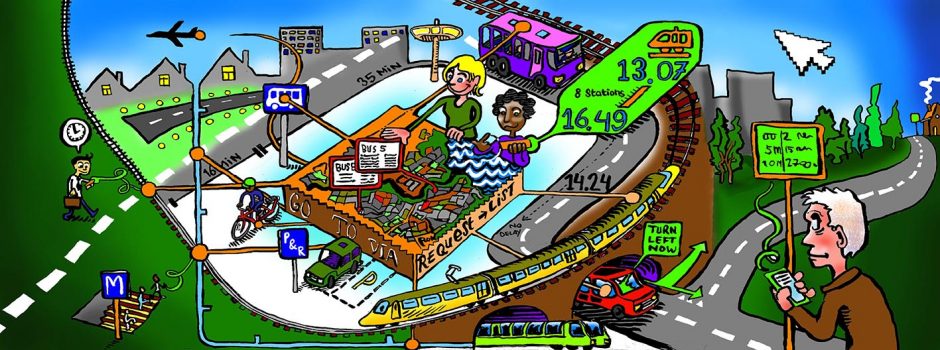There are major differences between assessing the technical feasibility and assessing the governability of intelligent mobility projects. Governance is perhaps the most critical variable of the two but also the most difficult to assess. Instead of trying to assess governability as an analytical challenge, it is perhaps more doable to focus on a ‘negotiated language’ to discuss governability during the project.
Key words: governability, technical feasibility, incrementalism, wickedness, negotiated language
A structural lack of means. A lack of political will. Major conflicts of interests. Leading politicians face the end of their period. Critical stakeholders remain unrepresented. The number of relevant parties seems interminable. The leading stakeholder withdraws halfway due to a completely unrelated scandal. The parties with authority don’t interact with the ones with expertise. Examples of governance problems are numerous. It seems that governance is not just about willingness. The question may even rise whether proper governance of mobility data is actually possible.
In the context of our interviews many respondents challenged or questioned the ‘governability’ of their ambitions. How to assess the governability of these innovative projects and how to respond accordingly? We take governability, quite literally, as the ability to manage an innovative development in line with the existing interests, rules and power relations. As such, governability is a full brother of ‘technical feasibility’.
There are striking differences between the way projects deal with ‘technical feasibility’ on the one hand and ‘governability’ on the other. Let us first describe these differences and then explain them. For technical feasibility, projects generally rely on expert judgment, often supported by a portfolio of previous projects and past performance. If yes, the project can move forward. From an empirical stance, also, the technological complexity of various projects in this domain of intelligent mobility is fairly constant and predictable, while the governability widely differs and may easily bring surprise. Whereas the technical feasibility of tackling privacy issues can be considered fairly constant, the governability can be quite another story.
The governability of projects is generally much less easy to assess than technical feasibility. First of all, there are many ‘soft’ and partly ‘hidden’ aspects to take into account, e.g. interests, relations, means, institutions, dynamics. Next, there is no natural expert to rely on. The assessment is virtually always political, temporary and full of uncertainties. All in all, assessing governability almost never brings a simple yes or no. Moreover, compared to technical complexity, it is much harder to make an analogy for governance complexity with respect to the performance in past and future cases. Though questioning the governability seems very relevant – even essential – the answers are often vague, contested and impractical.
Governance is perhaps the most critical variable for the feasibility of these projects but also the most difficult to assess. What should be the leading question? Should we focus on ‘the right’ governance structure? Should we run through a long list of relevant aspects (see all columns) and try to draw a critical line somewhere for minimal governability? Both options seem plausible, but there is no scientific basis, no consensus that supports such a distinct way of assessing the governability. Basically, governance is about human behaviour, of which assumptions are generally way more contested than assumptions from natural science. As a result, governance issues are ‘wicked’. ‘Wickedness’ means that any solution requires cooperation between actors with different assumptions and different priorities. Neither a scientific approach nor political decision-making suffices to deal with this.
This lack of consensus about governance may trigger project teams to continuously evaluate this. Surprisingly however, another general observation is that few projects systematically assess their governability, at least not explicitly. Why is that? Perhaps it is because most projects studied are still in a rather early stage of development. A different explanation is that assessing the governability of a challenge implies integrating different views of different people with different priorities. In other words: assessing governance is a wicked challenge in itself. It requires governance again, with all its efforts. This makes assessment of governability very unattractive for all trying to support the development of smart mobility, a laborious adventure with the certainty of disappointing outcomes.
Likewise, discussing how to assess governability seems disappointing as well. It is difficult, hardly done, at least explicitly, and ultimately not really doable. Though perhaps true, this cannot relieve us of the trouble to deal with governability. It remains highly relevant. One way to overcome this deadlock is to see the assessment of governability not as an analytical challenge, neither as a question to answer, nor a box to tick off, but as a variable, a constant uncertainty in a long and incremental process. In such a process, platform developers need to start developing a ‘negotiated language’ on governability. What makes governance complex for the specific case? What kinds of complexities are relevant? Why are these complexities considered manageable? Such a language would be a first common ground for actors developing smart mobility and a first step towards assessment. It helps to communicate about governance complexities and a first step in finding supported solutions.
